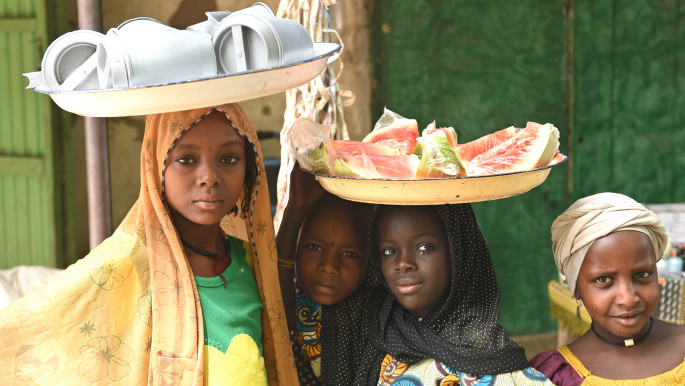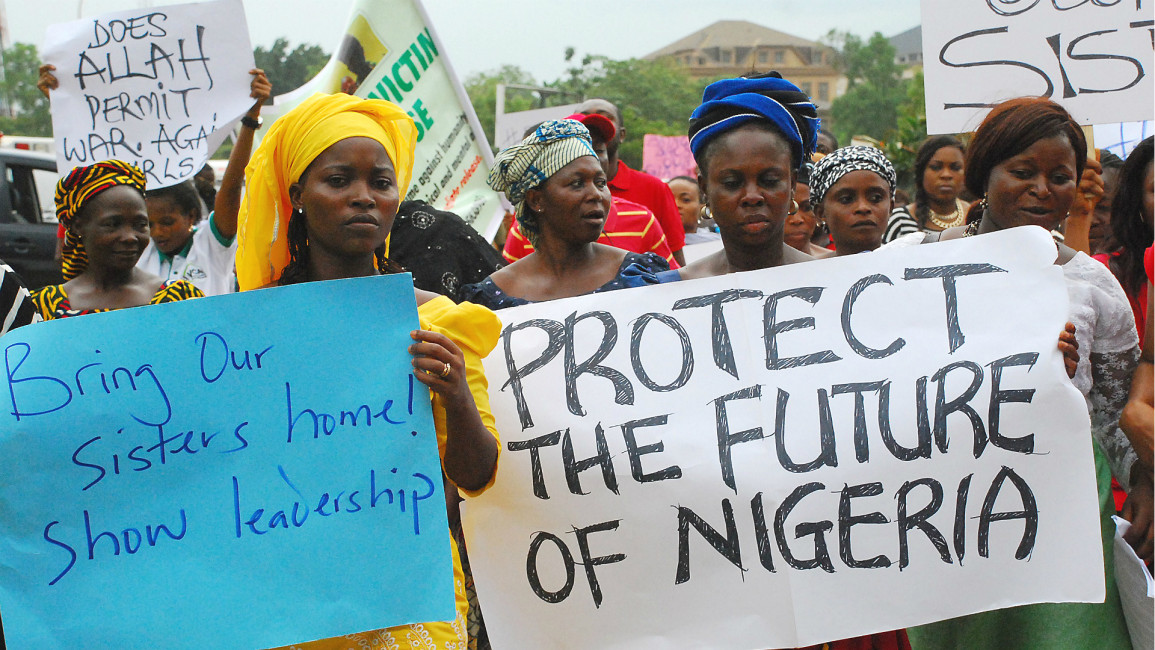Boko Haram's 'reign of terror'
As the country marked the first anniversary of the horrific kidnapping of 219 Chibok schoolgirls, Amnesty International released a report the same day revealing the militant group's war crimes and crimes against humanity.
Boko Haram, which says it is fighting to "overthrow the government and create an Islamic state" has wreaked havoc and crippled normal life for millions of people in northeast Nigeria since 2009.
Through a campaign of almost daily killings, bombings, abductions, looting and burning, the group has killed thousands of people and forced more than a million to flee their homes, 800,000 of them children.
But its most brutal campaign has been against women and girls, where many are abducted, imprisoned and in some cases raped, forcibly married and made to participate in armed attacks, sometimes on their own towns and villages.
"They used to train girls how to shoot guns," 19-year-old Aisha told Amnesty International.
She was abducted from a friend's wedding in September 2014 along with her sister, the bride and the bride's sister.
Boko Haram took them to a camp in Gullak, Adamawa state, home to approximately 100 abducted girls. One week later, Boko Haram forced the bride and the bride's sister to marry their fighters.
"I was among the girls trained to shoot. I was also trained how to use bombs and how to attack a village," Aisha added.
"This training went on for three weeks after we arrived. Then they started sending some of us to operations. I went on one operation to my own village."
Aisha said that during the three months that she was held captive, she was raped repeatedly, sometimes by groups of up to six fighters.
She also saw more than 50 people killed by Boko Haram, including her sister.
"Some of them refused to convert. Some refused to learn how to kill others. They were buried in a mass grave in the bush. They'll just pack the dead bodies and dump them in a big hole, but not deep enough. I didn't see the hole, but we used to get the smell from the dead bodies when they start getting rotten."
 |
Some of them refused to convert. Some refused to learn how to kill others. They were buried in a mass grave in the bush... They'll just pack the dead bodies and dump them in a big hole |  |
Since the start of 2014, Amnesty International has documented at least 300 raids and attacks carried out by Boko Haram against civilians.
During their attacks on towns, they would systematically target the military or police first, capturing arms and ammunition, before turning on the civilian population.
They would shoot anyone trying to escape, rounding up and executing men of fighting age.
"Men and women, boys and girls, Christians and Muslims, have been killed, abducted and brutalised by Boko Haram during a reign of terror which has affected millions," said Salil Shetty, Amnesty International's Secretary General.
After taking control of a town, Boko Haram would assemble the population and announce new rules with restrictions of movement, particularly on women, the report explained.
The group enforced its rules with harsh punishments, such as failure to attend daily prayers was punishable by public flogging.
A woman who spent five months under Boko Haram control in Gamborou told Amnesty International how she had seen a woman given 30 lashes for selling children’s clothes and a couple executed publicly for adultery.
 |
|
| Young girls in the country remain at risk (AFP/Getty) |
Lost hope
The human rights organisation has called on the Nigerian government, with the assistance of the international community, to take all possible legal steps to ensure protection of civilians and to help restore security in the country.
"The change of government in Nigeria provides an opportunity for a new approach to security in Nigeria after the dismal failure of recent years," Shetty added.
However, as Nigeria marks the first anniversary of the Chibok abduction, there seems to be a sense of lost hope in the country.
On Tuesday, Nigeria's president-elect Muhammadu Buhari cautioned that he could not make promises on the return of the schoolgirls.
"We do not know if the Chibok girls can be rescued. Their whereabouts remain unknown. As much as I wish to, I cannot promise that we can find them," he said in a statement.
"But I say to every parent, family member and friend of the children that my government will do everything in its power to bring them home."
The comments by Buhari, who takes office on 29 May, stand in contrast to outgoing President Goodluck Jonathan, who has repeatedly said the girls will be found, and the military, which said last year it knew where the teenagers were being held.
Yet there has been no official confirmation of many reports about the Chibok girls.
Boko Haram leader Abubakar Shekau claims that they had converted to Islam and been married off to his fighters.
However many other theories have also surfaced.
Some witness reports say they have been carried across to Cameroon in canoes, or that they were among young women and girls turned into suicide bombers by the extremists.
Some fear that their bodies are among those of Boko Haram 'wives' who were beheaded as the fighters fled the town of Baga last month.
 |
Some fear that their bodies are among those of Boko Haram 'wives' who were beheaded as the fighters fled the town of Baga last month |  |
A vigil demanding the girls' immediate release has been held almost every day since they were kidnapped in Nigeria's capital Abuja.
But no event has been planned in Chibok.
Chibok elder Enoch Mark, whose daughter and niece are among the captives, said the town was still in "perpetual fear" of Boko Haram, despite the presence of troops.
"The last one year has been a period of sadness, emotional torment and hardship. It has been one year of mourning. We are a bereaved community that has lost 219 daughters," he told AFP.
He added: "Our hope in finding our girls is now in Buhari. We hope we will soon see our girls if they are alive or at least their corpses if they are dead."



